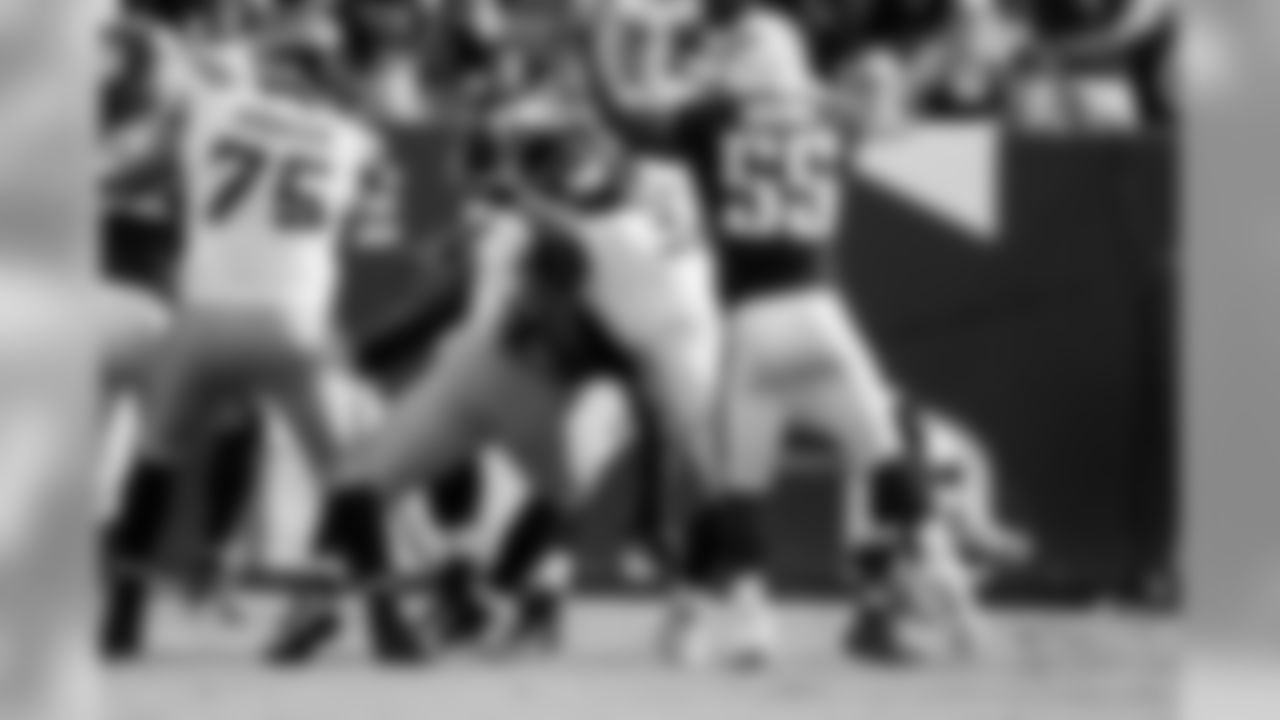Prior to Sunday's game in Tennessee, the Seahawks decided as a team to stay in their locker room because, as players said in a statement, "we will not stand for the injustices that has plagued people of color in this country."
Several players went into more detail on that decision following the game, and on Monday Seahawks coach Pete Carroll spoke at length on the topic, expressing support for his players. And while Carroll is supportive of his players and their message, he understands not everyone is in agreement, but what he hopes is that, with empathy, there can be greater understanding of where players are coming from. Carroll also reiterated what players have been saying all along, which is that these protests are not about the anthem or the flag or the military, but about using a public forum to protest injustice in this country.
"This is a really fascinating opportunity for us to understand that there's difference of how we look at things," Carroll said. "These are protests, they're statements and expressions of freedom of speech that can be taken however you want to take it. It's hard for everybody to see everybody's view, because we don't have the skills that empathy calls for to understand somebody has something to say, and empathy would call on us to listen and to not pass judgement. Then whether or not you want to demonstrate compassion by working to try to help their situation, that's what's at stake right here.
"And (the focus) has been so directed at just the flag or just law enforcement or other thoughts, that's not at all what the players are expressing. They're expressing freedom of speech and expression, and they have a lot to say and they're skilled at what they want to say and what they stand for. In that, I'd like to say too that our players are in a very fortunate situation. It has nothing to do with how much money they make. They're in a position where they can speak out and they can, hopefully, create change and get their points of view out there that are designed to help people. This isn't about the kind of salaries they make; they're very fortunate to be where they are and they know it, and they have the courage to speak out. That's not being recognized as much as we would like. It's more polarized in that. We understand why people are upset about it, but it is not about denigration of the flag, the country or anything that stands for. It's not about that at all. It's about trying to get your feelings out and your ideas across. Protests, just by the nature of the word, not everybody is going to agree—that's why it's a protest. I think it's extraordinary that this is happening and I think it's a moment that we all can learn what we want to learn out of this, but I hope we learn about empathy, to listen, to come to an understanding of what someone else feels without passing judgement. It doesn't mean you're going to agree. That's OK. That's OK. Hopefully, like I said, the compassion part will come about in the proper manner, and there will be action taken and there will be movement made, and we'll come to an understanding. It's hard. It's hard, but it's good."
When it comes to the idea of empathy, something Doug Baldwin spoke at length about Sunday evening, Carroll said that topic has "come through loud and clear" in discussions with his team. As Michael Bennett often points out, he's only a football player for part of his life, but he'll always be, in his words, "a black man in America" and with that comes life experiences that white people—be it fans, teammates or coaches, can't fully comprehend.
"That has come through loud and clear, that you are not just a football player, wearing a uniform, everywhere you go," Carroll said. "You are a regular citizen in the community. And that's where, in football, the inequalities don't demonstrate themselves. It's when we go into normal life settings. And that's when it's so powerful that we share that, what that feels like. We share what that feels like to be in another group and what their world is like and what their day-to-day, and what their existence is. Because I don't think that's understood very well. I think that's where we understand inequalities—'Because you are a football player you should be grateful and shut up'—that's not what's going on here. We are talking about what's happening on the other side of the world and what's going on around us to try to share that experience, so others can come to understand: 'Oh, that's why you are protesting. That's why you've been talking about this for hundreds of years.' And we hear it and know it loud and clear and we have great respect for what everyone goes through, because of that. And so it is the topic.
"Just in our own world right here our players have a lot to say, they have a lot to offer, and it is because they are so concerned and they care so much and it's so important. Not everybody understands that. Not everybody understands the inequalities that other people see and because of that, often because you can't see it doesn't mean it's not there. And I think that's a really important fact, because I think a lot of people are speaking about things and making references to stuff because they don't understand why people are willing to protest or willing to stand up and try to speak out and I don't think they are recognizing the courage that that takes and what they may be jeopardizing and all that. I think this is such an important moment, and I don't think we should miss it, and I think we need to go into it further and we need new skills. We need new empathy skills. We need it, and hopefully maybe somebody will come up about that and maybe we will find some new teachers and we will come to understand how to move forward. It's an exciting potential. I hope it happens."
This isn't a new topic for the Seahawks—they've held lengthy, in depth discussions on race and empathy and so many important topics dating back to last summer when Colin Kaepernick started the conversation around the league with his own protest. Back in March, long before Donald Trump referred to NFL players as "sons of (expletives)" and suggested NFL owners fire any player who protests during the anthem, Carroll talked about how players and the NFL have an “extraordinary opportunity” to be catalysts for change in the world. But now that Trump's comments have led to Sunday's watershed moment, the Seahawks are more committed to fighting injustice and inequality than ever. And on Sunday that included some players staying in the locker room despite being somewhat uncomfortable with that, and those players' willingness to do so was powerful, Carroll said.
"I think it's a wonderful statement of being part of something and being willing to listen to the other side and to be empathetic and make choices based on wanting to support those others, and that's huge, that's a huge statement," Carroll said. "It might be one of the most powerful statements that people are willing to listen to the other side and then act accordingly as opposed to not listening and not hearing it. I think it's hugely important. If we're going to move forward, we have to listen to the message that's being screamed at us about inequality and we have to listen. It has nothing to do with what a lot of other stuff has to do with. It's just listening and finding a way to understand and then hopefully going to the compassion and being willing to do something about it."
RELATED
The Seahawks fall short 33-27 against the Titans in Week 3 at Nissan Stadium.





































